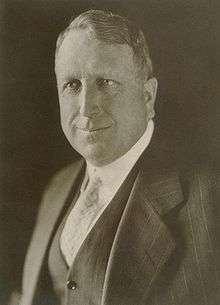
William Randolph Hearst (April 29, 1863 – August 14, 1951) was an American newspaper publisher who built the nation's largest newspaper chain and whose methods profoundly influenced the history of American journalism. Hearst entered the publishing business in 1887 after being given control of The San Francisco Examiner by his wealthy father. Moving to New York City, he acquired The New York Journal and engaged in a bitter circulation war with Joseph Pulitzer's New York World that led to the creation of yellow journalism—sensationalized stories featuring crime, corruption, and sex, and of sometimes dubious veracity. Acquiring more newspapers, Hearst created a chain that numbered nearly 30 papers in major American cities at its peak. He later expanded to magazines, creating the largest newspaper and magazine business in the world.
He was twice elected as a Democrat to the U.S. House of Representatives, and ran unsuccessfully for Mayor of New York City in 1905 and 1909 and for Governor of New York in 1906. His life story was the main inspiration for Charles Foster Kane, the lead character in Orson Welles's film Citizen Kane.
Quotes
- We hold that the greatest right in the world is the right to be wrong, that in the exercise thereof people have an inviolable right to express their unbridled thoughts on all topics and personalities, being liable only for the abuse of that right.
- Platform, Independent League; N.Y. Journal (February 1, 1924)
- We hold that no person or set of persons can properly establish a standard of expression for others.
- Platform, Independent League; N.Y. Journal (February 1, 1924)
- What has become of the descendants of the irresponsible adventurers, the scapegrace sons, the bond servants, the redemptionists and the indentured maidens, the undesirables, and even the criminals, which made up-not all, of course, but nevertheless a considerable part of-the earliest emigrants to these virgin countries?
They have become the leaders of the thought of the world, the vanguard in the march of progress, the inspirers of liberty, the creators of national prosperity, the sponsors of universal education and enlightenment.- Communication to the American Crime Study Commission (May 19, 1929)
- The NARROW-MINDED BIGOTS have given to this country and to the world freedom of speech, freedom of thought and action and religious liberty.
- Communication to the American Crime Study Commission (May 19, 1929)
- Any man who has the brains to think and the nerve to act for the benefit of the people of the country is considered a radical by those who are content with stagnation and willing to endure disaster.
- Interview, Cleveland Plain Dealer (October 24, 1932)
- A politician will do anything to keep his job-even become a patriot.
- Editorial (August 28, 1933)
- SEVENTH, the text of a newspaper must tell the news.
The headlines must tell the news.
The pictures must tell the news.
The subheads and subtitles must tell the news.
Please see that the newspapers perform this function.- Instructions to E.D. Coblentz (March 1, 1938)
- When free discussion is denied, hardening of the arteries of democracy has set in, free institutions are but a lifeless form, and the death of the republic is at hand.
- "In the News" (June 13, 1941)
- Please realize that the first duty of newspaper men is the get the news and PRINT THE NEWS.
- Quoted in Editor & Publisher (August 12, 1944)
- Whatever is right can be achieved through the irresistible power of awakened and informed public opinion. Our object, therefore, is not to enquire whether a thing can be done, but whether it ought to be done, to so exert the forces of publicity that public opinion will compel it be done.
- Advertisement, N.Y. Herald Tribune (August 19, 1946)
- According to American principle and practice the public is the ruler of the State, and in order to rule rightly it should be informed correctly.
- N.Y. Journal-American (November 11, 1954)
Disputed
- You furnish the pictures and I'll furnish the war.
- Alleged cable to illustrator Frederic Remington while Hearst was covering the Cuban War of Independence (1898). Campbell, W. Joseph (Professor in the School of Communication at American University in Washington, D.C.) questions the sources of the alleged quote in both his books Yellow Journalism: Puncturing the Myths, Defining the Legacies (2003), p. 72 and Getting It Wrong: Debunking the Greatest Myths in American Journalism (2016), also in a respective blog entry.